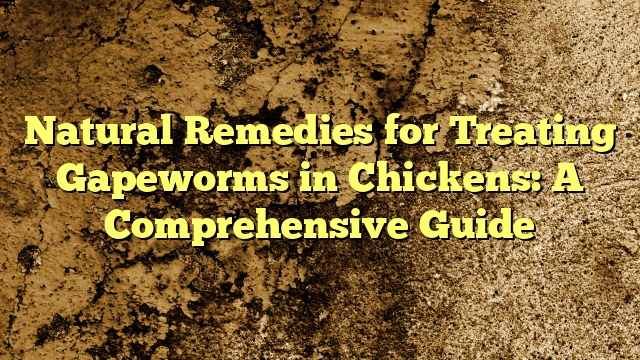Natural Remedies for Treating Gapeworms in Chickens: A Comprehensive Guide
Natural Remedies for Treating Gapeworms in Chickens: A Comprehensive Guide
Gapeworms are a common parasitic problem in backyard poultry, causing significant distress to chickens and their owners alike. These worms attach themselves to the trachea of the bird, leading to difficulty in breathing, characterized by a gaping mouth, hence the name. Fortunately, there are several natural remedies that can help treat and prevent this condition, ensuring the health and happiness of your feathered friends.
Understanding Gapeworms
Before diving into the remedies, it’s crucial to understand what gapeworms are and how they affect your chickens. Gapeworms, scientifically known as Syngamus trachea, are parasites that live in the respiratory tract of birds. Chickens get infected by ingesting the eggs of the worm, which can be found in the soil, on vegetation, or in intermediate hosts like earthworms.
Signs of Gapeworm Infection
- Difficulty breathing or gasping for air
- Stretching the neck and gaping the beak
- Reduced appetite and weight loss
- Weakness and lethargy
- In severe cases, death due to suffocation
Natural Remedies for Gapeworms
While chemical treatments are available, many poultry keepers prefer natural remedies to treat gapeworms, especially for minor infections or as preventive measures. Here are some effective natural treatments:
Garlic
Garlic is known for its natural anthelmintic properties, which can help expel parasites from the body. To use garlic as a treatment:
- Crush several cloves of garlic and mix them into the drinking water of your chickens.
- Continue this treatment for 7-10 days to ensure all worms are expelled.
Apple Cider Vinegar
Apple cider vinegar (ACV) can help create an acidic environment in the chicken’s gut, which is inhospitable to parasites. To use ACV:
- Add 1 tablespoon of ACV to 1 gallon of the chickens’ drinking water.
- Offer this solution for 3-5 days each month as both a treatment and preventive measure.
Pumpkin Seeds
Pumpkin seeds contain cucurbitacin, which has been shown to have anthelmintic effects. To use pumpkin seeds:
- Grind up raw pumpkin seeds and mix them into the feed.
- Provide this mixture for at least a week to help expel the worms.
Diatomaceous Earth
Diatomaceous earth (DE) is a fine powder made from the fossilized remains of diatoms, a type of algae. While it’s more commonly used to control external parasites, some poultry keepers use it for internal parasites as well. To use DE:
- Mix food-grade DE with the chicken feed at a ratio of 2% of the total feed weight.
- Continue this treatment for a month to ensure effectiveness.
Preventive Measures
Prevention is always better than cure. Here are some steps you can take to prevent gapeworm infections in your flock:
Good Hygiene Practices
- Regularly clean and disinfect the coop and feeding areas.
- Ensure the coop is well-ventilated to reduce moisture and the risk of parasite transmission.
Proper Feeding
- Avoid overfeeding, as leftover feed can attract wild birds and rodents that may carry parasites.
- Consider hanging feeders to reduce contact with the ground.
Regular Health Checks
- Monitor your chickens regularly for signs of gapeworm infection and other health issues.
- Quarantine new birds before introducing them to your flock to prevent the spread of parasites.
Conclusion
Gapeworms can be a distressing issue for both chickens and their owners, but with the right knowledge and tools, they can be effectively managed and prevented. By incorporating natural remedies and maintaining good hygiene and management practices, you can keep your flock healthy and happy. Remember, if an infection is severe or does not improve with natural treatments, consult a veterinarian for professional advice and treatment options.
References
| Source | Link |
|---|---|
| Comprehensive Guide to Chicken Parasites | Link to Guide |
| Natural Poultry Keeping | Link to Resource |
This HTML article provides a comprehensive guide on natural remedies for treating gapeworms in chickens, including understanding the condition, identifying signs of infection, exploring various natural treatments, and implementing preventive measures. It also emphasizes the importance of good hygiene practices, proper feeding, and regular health checks to prevent gapeworm infections.

